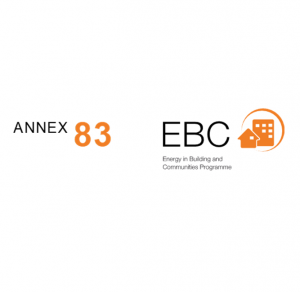Organiser: IEA-EBC Annex 83
Tuesday, 19 July 2022 | 14:00h – 18:00h
Room Seminar 1+2
Format: World-Café
Positive Energy Districts (PEDs) are viewed as urban areas capable of generating a surplus of net renewable energy and achieving net zero carbon emissions. The design of PEDs includes a variety of aspects to be taken into consideration, ranging from technological to flexibility and smart control issues, sustainability assessment implications and guidelines for PED planning and implementation. In this framework the activities of the International Energy Agency –Energy in Buildings and Communities IEA-EBC Annex 83 “Positive Energy Districts”, aim at creating a shared in-depthframework for PED definition, design and applications (annex83.iea-ebc.org/).
Programme:
The idea of the event is based on the presentation of the Annex 83 main outcomes and results to be shared among stakeholders organized in small breakout groups, in which participants will rotate. Group discussions will be organized to foster the discussion and encourage for a fruitful exchange of ideas.
Presentation
- The main outcomes and results of Subtask A “Definitions and context”
- The main outcomes and results of Subtask B “Methods, Tools and Technologies for Realizing Positive Energy Districts”
- The main outcomes and results of Subtask C “Organizing principles and impact assessment”
- The main outcomes and results of Subtask D “Demos, implementation and dissemination”
Moderators:
- Francesco Guarino, University of Palermo
- Francesco Reda, VTT Technical Research Centre of Finland
Keynote speakers:
Vicky Albert-Seifried, Andrea Gabaldon, Rosaria Volpe, Matthias Haase/Sergio Diaz de Garayo Balsategui/Anna Kozlowska
This event is part of the “PED day”, also linked to the workshop “Planning a Positive Energy District”

